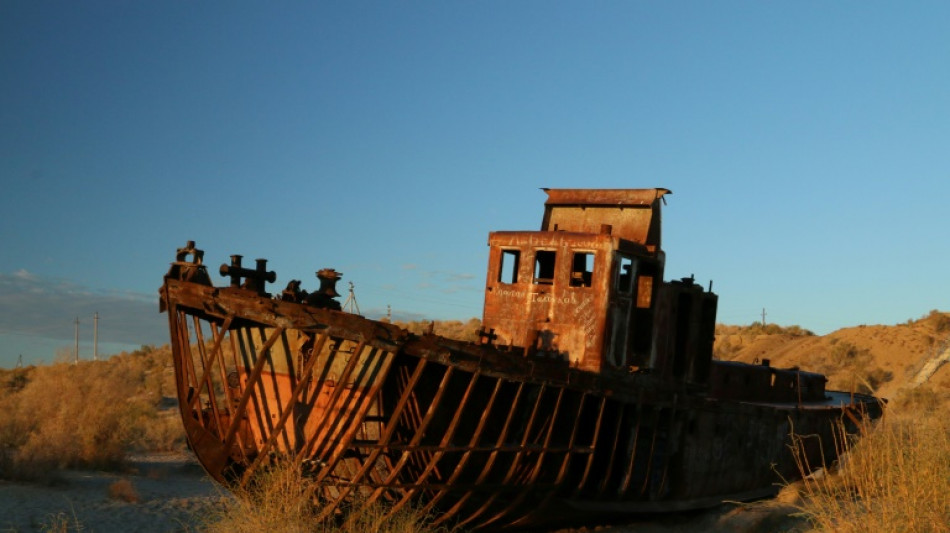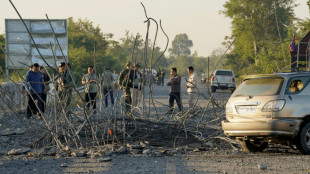
-
 India's Bollywood counts costs as star fees squeeze profits
India's Bollywood counts costs as star fees squeeze profits
-
McCullum admits errors in Ashes preparations as England look to salvage pride

-
 Pets, pedis and peppermints: When the diva is a donkey
Pets, pedis and peppermints: When the diva is a donkey
-
'A den of bandits': Rwanda closes thousands of evangelical churches

-
 Southeast Asia bloc meets to press Thailand, Cambodia on truce
Southeast Asia bloc meets to press Thailand, Cambodia on truce
-
As US battles China on AI, some companies choose Chinese

-
 AI resurrections of dead celebrities amuse and rankle
AI resurrections of dead celebrities amuse and rankle
-
Steelers receiver Metcalf strikes Lions fan

-
 Morocco coach 'taking no risks' with Hakimi fitness
Morocco coach 'taking no risks' with Hakimi fitness
-
Gang members given hundreds-years-long sentences in El Salvador

-
 Chargers, Bills edge closer to playoff berths
Chargers, Bills edge closer to playoff berths
-
Gang members given hundred-years-long sentences in El Salvador

-
 Hosts Morocco off to winning start at Africa Cup of Nations
Hosts Morocco off to winning start at Africa Cup of Nations
-
No jacket required for Emery as Villa dream of title glory

-
 Amorim fears United captain Fernandes will be out 'a while'
Amorim fears United captain Fernandes will be out 'a while'
-
Nigerian government frees 130 kidnapped Catholic schoolchildren

-
 Captain Kane helps undermanned Bayern go nine clear in Bundesliga
Captain Kane helps undermanned Bayern go nine clear in Bundesliga
-
Captain Kane helps undermanned Bayern go nine clear

-
 Rogers stars as Villa beat Man Utd to boost title bid
Rogers stars as Villa beat Man Utd to boost title bid
-
Barca strengthen Liga lead at Villarreal, Atletico go third

-
 Third 'Avatar' film soars to top in N. American box office debut
Third 'Avatar' film soars to top in N. American box office debut
-
Third day of Ukraine settlement talks to begin in Miami

-
 Barcelona's Raphinha, Yamal strike in Villarreal win
Barcelona's Raphinha, Yamal strike in Villarreal win
-
Macron, on UAE visit, announces new French aircraft carrier

-
 Barca's Raphinha, Yamal strike in Villarreal win
Barca's Raphinha, Yamal strike in Villarreal win
-
Gunmen kill 9, wound 10 in South Africa bar attack

-
 Allegations of new cover-up over Epstein files
Allegations of new cover-up over Epstein files
-
Atletico go third with comfortable win at Girona

-
 Schwarz breaks World Cup duck with Alta Badia giant slalom victory
Schwarz breaks World Cup duck with Alta Badia giant slalom victory
-
Salah unaffected by Liverpool turmoil ahead of AFCON opener - Egypt coach

-
 Goggia eases her pain with World Cup super-G win as Vonn takes third
Goggia eases her pain with World Cup super-G win as Vonn takes third
-
Goggia wins World Cup super-G as Vonn takes third

-
 Cambodia says Thai border clashes displace over half a million
Cambodia says Thai border clashes displace over half a million
-
Kremlin denies three-way US-Ukraine-Russia talks in preparation

-
 Williamson says 'series by series' call on New Zealand Test future
Williamson says 'series by series' call on New Zealand Test future
-
Taiwan police rule out 'terrorism' in metro stabbing

-
 Australia falls silent, lights candles for Bondi Beach shooting victims
Australia falls silent, lights candles for Bondi Beach shooting victims
-
DR Congo's amputees bear scars of years of conflict

-
 Venison butts beef off menus at UK venues
Venison butts beef off menus at UK venues
-
Cummins, Lyon doubts for Melbourne after 'hugely satsfying' Ashes

-
 'It sucks': Stokes vows England will bounce back after losing Ashes
'It sucks': Stokes vows England will bounce back after losing Ashes
-
Australia probes security services after Bondi Beach attack

-
 West Indies need 462 to win after Conway's historic century
West Indies need 462 to win after Conway's historic century
-
Thai border clashes displace over half a million in Cambodia

-
 Australia beat England by 82 runs to win third Test and retain Ashes
Australia beat England by 82 runs to win third Test and retain Ashes
-
China's rare earths El Dorado gives strategic edge

-
 Japan footballer 'King Kazu' to play on at the age of 58
Japan footballer 'King Kazu' to play on at the age of 58
-
New Zealand's Conway joins elite club with century, double ton in same Test

-
 Australian PM orders police, intelligence review after Bondi attack
Australian PM orders police, intelligence review after Bondi attack
-
Durant shines as Rockets avenge Nuggets loss


Half world's largest lakes and reservoirs drying up: study
More than half of the world's largest lakes and reservoirs are dwindling and placing humanity's future water security at risk, with climate change and unsustainable consumption the main culprits, a study said Thursday.
"Lakes are in trouble globally, and it has implications far and wide," Balaji Rajagopalan, a professor at the University of Colorado Boulder and co-author of the paper, which appeared in Science, told AFP.
"It really caught our attention that 25 percent of the world's population is living in a lake basin that is on a declining trend," he continued, meaning some two billion people are impacted by the findings.
Unlike rivers, which have tended to hog scientific attention, lakes aren't well monitored, despite their critical importance for water security, said Rajagopalan.
But high profile environmental disasters in large water bodies like the Caspian Sea and the Aral Sea, signaled to researchers a wider crisis.
To study the question systematically, the team, which included scientists from the United States, France, and Saudi Arabia, looked at Earth's biggest 1,972 lakes and reservoirs, using observations from satellites from 1992-2020.
They focused on larger freshwater bodies because of the better accuracy of satellites at a larger scale, as well as their importance for humans and wildlife.
- 17 Lake Meads lost -
Their dataset merged images from Landsat, the longest-running Earth observation program, with water surface height acquired by satellite altimeters, to determine how lake volume varied over nearly 30 years.
The results: 53 percent of lakes and reservoirs saw a decline in water storage, at a rate of approximately 22 gigatonnes a year.
Over the whole period studied, 603 cubic kilometers of water (145 cubic miles) was lost, 17 times the water in Lake Mead, the United States' largest reservoir.
To find out what drove the trends, the team used statistical models incorporating climate and hydrologic trends to tease out natural and human-driven factors.
For natural lakes, much of the net loss was attributed to climate warming as well as human water consumption.
Increased temperatures from climate change drive evaporation, but can also decrease precipitation in some places.
"The climate signal pervades all factors," said Rajagopalan.
Lead author Fangfang Yao, a visiting fellow at CU Boulder, added in a statement: "Many of the human and climate change footprints on lake water losses were previously unknown, such as the desiccations of Lake Good-e-Zareh in Afghanistan and Lake Mar Chiquita in Argentina."
- Losses in humid regions, too -
One surprising aspect was that lakes in both wet and dry regions of the world are losing volume, suggesting the "dry gets drier, wet gets wetter" paradigm that is frequently used to summarize how climate change affects regions, doesn't always hold.
Losses were found in humid tropical lakes in the Amazon as well as Arctic lakes, demonstrating a trend more widely spread than predicted.
Accumulating sedimentation was blamed for storage loss in drying reservoirs.
But although most global lakes were dwindling, nearly a quarter saw significant increases in their water storage.
These included in the Tibetan Plateau, "where glacier retreat and permafrost thawing partially drove alpine lake expansion," the paper said.
Hilary Dugan, a scientist who studies freshwater systems at the University of Wisconsin-Madison and who wasn't involved in the study, told AFP the research advanced scientific understanding of lake volume variability, which is of "huge importance."
It is "unique in that it focuses on specific lakes, and reports the amount of water as a volume," she said.
But she added: "It's important to keep in mind that many water supplies are from small lakes and reservoirs," and future research should consider these too.
Globally, freshwater lakes and reservoirs store 87 percent of the planet's liquid freshwater, underscoring the urgency of new strategies for sustainable consumption and climate mitigation.
"If a good chunk of freshwater lakes are drying, then you're going to see the impact come to you one way or the other, if not now in the not too distant future," said Rajagopalan.
"So it behooves all of us to be good stewards."
O.Karlsson--AMWN



